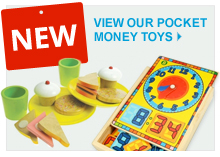I was recently reading a study in the value of play by leading psychologist Jeffrey Goldstein which concluded that kids who have access to a large range and variety of toys in their childhood are far more likely to achieve higher mental stimulation and to challenge themselves to learn through their play.
When you see a child playing with a toy, you kind of take it for granted that that’s just what kids do. You give them a toy and they play with it. Simples. It’s been happening since the dawn of time and it’s what kids do.
However, can you imagine a world without toys? Where children simply exist, passing time until they are adults and start to do the mundane things in life such as working, cleaning the house or washing the car? Do you think that our children would grow up to be accomplished, educated and well rounded adults if this were the case? Me neither.
It’s almost inconceivable to imagine a childhood without toys and it’s sometimes overlooked just how beneficial toys and play in general are and how important they are to our children’s mental, social and physical development.
Play is central to a child’s development on all levels. By playing, kids learn about the world they live in and just as importantly, they learn about themselves and what their incredible little bodies and minds are capable of. Play encourages lots of things, including:
- The ability to plan and solve problems that toys present to them
- The ability to use their imagination by adapting their toys to environment
- Increased creativity – the toys they play with can be used with their other toys
- The development of communication and their language
- The development of fine and gross motor skills
- The improvement of agility, balance and co-ordination
- Encouraging them to socialise with other children and adults
One crucial point comes out of the research from the study and that is that the price of the toy is totally irrelevant. What’s far more important is the variety of toys that is available to a child to play with. Instead of buying one toy for £100, researchers conclude it’s much more beneficial to the child for them to have 5 different toys for a much lower value, so long as they provide the child with a mixture of different types of play. These types of play include:
1) Exploratory – where a very young child uses toys to become aware of their world and their senses. For example, a baby would play with a baby mobile or baby rattle and develop the senses of sight, sound and touch and feel.
2) Constructive – for toddlers this is a crucial stage when they learn to take things apart and reassemble them in the right order. By doing this with toys like shape sorters, building blocks and wooden puzzles, they also learn about shapes, weight, colours and different textures.
3) Pretend – immersing themselves in a world of make believe is very important to children. They can play with toys such as wooden farms, dolls’ houses, toy castles, toy garages and toy pirate ships and lose themselves in their own imagination, without the need for input by Mum, Dad, Granny or Granddad.
4) Role Play – learning from adults is a very important developmental process for kids. Just watching Mum and Dad cook, do the shopping, iron the clothes or hang out the washing is extremely beneficial and if they can copy you through play then they will benefit even further. Toys such as toy kitchens, play food, dolls’ prams and shopping or gardening toys are ideal and make kids really feel like they’re contributing to their daily life.
5) Energetic – physical play helps kids develop essential muscles to benefit their running, climbing and stamina and provides them with a level of fitness which will help them to integrate into all sorts of social scenarios, especially their first school. Toys such as balance bikes, wooden swings, skipping ropes and other outdoor toys such as cricket and football are great starting points.
6) Skilful – toys that encourage practice and care help children in their later education as they teach them that practicing something which initially seems difficult and daunting can be overcome by perseverance and patience. A wooden jigsaw puzzle is the example that immediately springs to mind.
7) Social – last but not least by any means. Toys that develop a child’s social skills are tremendously important and toys like train sets, marble runs, wooden play centres, sandpits and artistic toys such as easels are great for when friends visit as they throw children together to interact through their play and they learn about vital social skills such as sharing and compassion.
Most importantly, we must remember, that although the educational value of toys is extremely important, so is the need for your child to have fun. Sometimes we parents can become a little too obsessed with buying a toy that aids or augments their developmental progression and lose sight of the fact that fun is the number one priority when choosing a toy and the other benefits will naturally follow.














